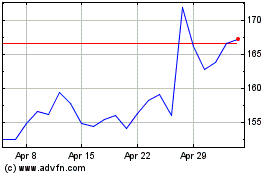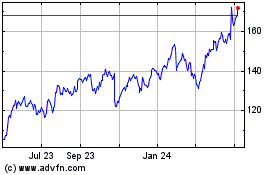Google Fined $57 Million in Biggest Penalty Yet Under New European Law -- Update
January 21 2019 - 11:30AM
Dow Jones News
By Sam Schechner
Alphabet Inc.'s Google was fined 50 million euros ($57 million)
by a French regulator--the biggest penalty levied yet under a new
European privacy law--alleging the search-engine giant didn't go
far enough to get valid user consent to gather data for targeted
advertising.
The fine is one of the highest profile regulatory actions
stemming from the European Union's "General Data Protection
Regulation," which went into effect in 2018. The law requires
companies to abide by strict data-protection and privacy rules
protecting consumers in Europe.
A big part of the new rules is that companies must explain to
users how their data is being collected and used and in many cases,
seek consent from users to collect it.
"People expect high standards of transparency and control from
us. We're deeply committed to meeting those expectations and the
consent requirements of the GDPR. We're studying the decision to
determine our next steps," a Google spokesman said.
The fine is small for Google, but it is by far the biggest
penalty issued so far by any of the national regulators with
authority to use GDPR to redress what they deem as insufficient
data or privacy protection.
It also represents the starting pistol of what many observers
say could be a raft of regulator actions as officials wield the new
legal tool--and potentially test its bounds.
Monday's ruling focused on how easy to find and how complete was
the information Google provided to consumers to inform their
consent for the use of their data.
France's National Data Protection Commission said Google
violated rules requiring information about data collection to be
transparent. It said full information about things like
data-processing purposes and data-storage time periods weren't
presented in the same place--in some cases requiring up to five or
six clicks. It said that some boxes to give consent were already
checked, meaning the consent wasn't affirmative, and said this was
a violation of the law.
The agency said Google hadn't obtained appropriate user consent
for personalized ads on its platforms. It said such user consent
wasn't "sufficiently informed," because of a lack of information
about how the company used the data to personalizes its ads.
Write to Sam Schechner at sam.schechner@wsj.com
(END) Dow Jones Newswires
January 21, 2019 11:15 ET (16:15 GMT)
Copyright (c) 2019 Dow Jones & Company, Inc.
Alphabet (NASDAQ:GOOGL)
Historical Stock Chart
From Jun 2024 to Jul 2024

Alphabet (NASDAQ:GOOGL)
Historical Stock Chart
From Jul 2023 to Jul 2024
